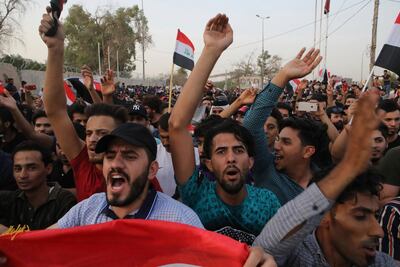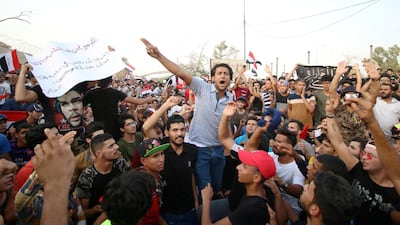A Baghdad-based war monitor and rights group has put the number of protesters killed and wounded in recent demonstrations across the south of the country at more than 800.
“The clashes between security forces and protesters in Iraq’s south and centre left 831 people dead and injured since the start of the demonstrations 10 days ago,” Mostafa Saadon, a spokesman for the Iraqi Observatory for Human Rights, said at a press conference on Sunday.
Demonstrations have roiled swathes of southern and central Iraq since erupting in the oil-rich port city of Basra on July 8, when security forces opened fire on a small protest killing one person.
__________
Read more:
The leaderless protests of southern Iraq see years of neglect boil over
Iraq heatwave lays bare shortcomings in country's energy sector
___________
Medical sources have put the death toll at 11, three in each of the cities of Basra, Samawah and Najaf, and one in both the cities of Diwaniyah and Karbala.
Most were killed by gunfire from unidentified assailants, while one person suffocated to death on tear gas used to disperse the demonstrators. One victim was a 20-year-old man killed by a guard from the local headquarters of the Iran-backed Badr organisation on Friday.
Mr Saadon also warned that Iraqi authorities were carrying out a large-scale search to find and arrest demonstrators.
“Iraqi authorities arrested 348 people for taking part in the rallies, 314 of whom were released later after signing a pledge that they will not stage or call for any protests afterwards,” said Hesam el-Hashemy of the Iraqi Observatory for Human Rights.
On Thursday, populist leader Moqtada Al Sadr, whose coalition won the most seats in May’s elections, called for a halt on talks to form a new government until the needs of the protesters were met. Mr Al Sadr won the election promising to eradicate poverty and corruption and resist interference from Iran.
Factions, he tweeted, "have to suspend all political dialogues for forming coalitions until they meet protesters’ rightful demands". In the past, Mr Al Sadr has been accused of rallying protests against the government.
Grand Ayatollah Ali Al Sistani, the most powerful cleric in Iraq, has also expressed solidarity with the demonstrators.
On Sunday fresh protests hit Samawah and Nasiriyah, with demonstrators chanting "no to corruption".
In Baghdad, security forces remained deployed around the city after struggling on Friday to disperse crowds of angry protesters who gathered at Tahrir Square and tried to breach the Green Zone where the government sits. One protester held up a poster which read: ‘The revolution of the poor.’ Water cannons, tear gas and beating was used to disperse demonstrators. No casualties were reported.

Dozens of members of the security forces have also been wounded in an attempt to quell the protests.
Since the start of the demonstrations, those involved have focused their anger on the political establishment, with government buildings and party offices being sacked or set ablaze.
The Iraqi authorities have scrambled to halt the unrest and have blocked social media sites online to try to prevent the spread of protests.
Iraq is in a state of political limbo with Prime Minister Haider Al Abadi overseeing a caretaker government as wrangling to form a new cabinet drags on after elections in May. The government maintains that the protesters' demands are legitimate, but says saboteurs are behind the violence.
"The promises they make are all lies," Khaled Hassan, 42, a health worker in Basra told Reuters. "We will not keep quiet."
"We are demanding the sacking of the governor and removal of all corrupt officials from the province," said Faris Abdel Karim, who helped organise a protest outside the house of the provincial governor in the city of Nasiriya, where police fired in the air, wielded batons and fired tear gas.

